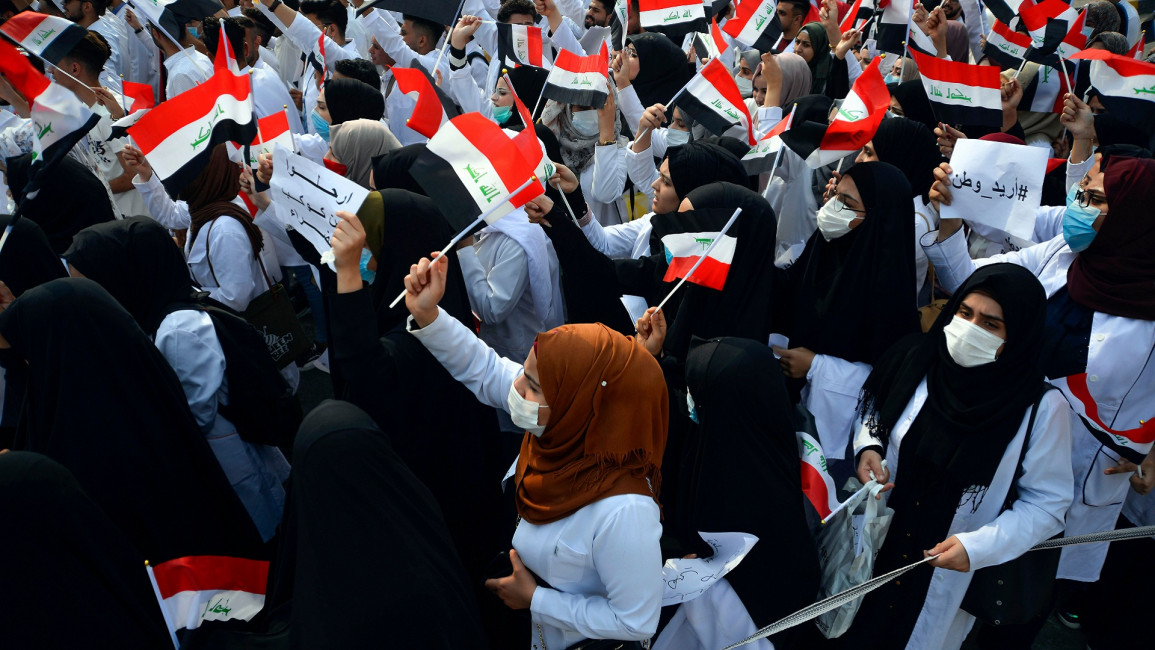More Iraqi students join anti-government protests despite deadly crackdown
Iraqi students and schoolchildren took to the streets of Baghdad and the south of the country on Monday to join escalating calls for the government to quit, defying the education minister, legal threats and even their parents.
"No school, no classes, until the regime collapses!" protestors shouted in Diwaniyah, 180 kilometres (120 miles) south of the capital.
In Baghdad, several students were injured after security forces fired tear gas and used batons to beat protesters. Video was uploaded to Twitter showing security forces assaulting female students.
Another video showed a school principal manhandling female school students who also held a small rally.
|
— Rudaw English (@RudawEnglish) October 28, 2019" style="color:#fff;" class="twitter-post-link" target="_blank">Twitter Post
|
Baghdad and south Iraq have been rocked by a second wave of rallies over government corruption, unemployment and poor services.
On Monday, Diwaniyah's union of universities and schools announced a ten-day strike "until the regime falls", with thousands of students and even professors flooding the streets.
Several local syndicates, including lawyers and engineers, also joined the movement, with picket lines preventing government workers from reaching their offices.
Read more: Why are people protesting in Iraq
They took to the streets despite the Minister of Higher Education Qusay al-Suhayl warning on Sunday that students and academics should "stay away" from protests, after around a dozen schools and universities in Baghdad had joined sweeping rallies.
A spokesman for embattled Prime Minister Adel Abdel Mahdi threatened any further disruption to schools would be met with "severe punishment."
At least 74 people have been killed since Friday, according to the Iraqi High Commission for Human Rights, and nearly 4000 have been injured. Most of the injuries have been caused by tear gas.
In Basra, local sources told The New Arab that a protester died on Monday morning as a result of his injuries and that dozens of people had been detained by security forces because of their participation in protests.
But young protesters still gathered on Monday morning in the city and other southern cities such as Nasiriyah and Kut, where most local government offices were shuttered as workers had not showed up.
Major-General Abdul Karim Khalaf, a spokesman for the Chief of Staff of the Iraqi Armed Forces, said that starting on Monday, absence and attendance of workers at government offices would be monitored.
Absent workers would be penalised or fired, he said, and those who "incited" students to protest would be put on trial.
However, students on university campuses and in Tahrir Square remained defiant despite the government's warnings.
"Qusay al-Suhayl said not to come down into the streets. But we say: no nation, no class!" one student protester said in Tahrir.
"All we want is for the government to immediately submit its resignation. Either it resigns, or it gets ousted," he added.
A group of three students drove up close to the square, unloading kits and cans of Pepsi to treat those affected by tear gas.
"It's my first day at the protests. I told my mom I'm going to class, but I came here instead!" a girl with curly hair told AFP.



